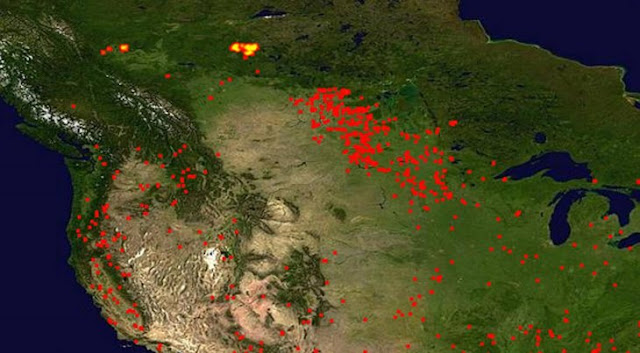Thanks,
Harold Hensell
Fires
around Ft McMurray
Fires
around Ft McMurray, Alberta, Saskatchewan and elsewhere. A lot of
fire season left. A warmer climate is enhancing fires
Alberta fires push oil prices to seven-month high
26
May, 2016
Thursday,
May 26, 2016, 5:02 PM - Earlier this week, the Bank of Canada
announced that recent wildfires in Alberta and Saskatchewan will push
the nation's GDP into the negative this quarter amid slowing oil
production.
Now,
it has been revealed the fires have also contributed to a seven-month
high for oil, with prices hitting $50 a barrel for the first time
since October 2015.
Though
starting off high Thursday, prices ultimately settled lower on the
day, Reuters reports.
In
addition to the Fort McMurray fires, which significantly slowed oil
production in Canada, unrest in Nigeria and Libya and economic woes
in Venezuela have resulted in a loss of nearly four million barrels
per day in production.
CANADA'S
GDP EXPECTED TO SINK TO RED
"Fire-related
destruction and the associated halt to oil production will cut about
1¼ percentage points off real GDP growth in the second quarter,"
the central bank said in a statement, via the CBC, Wendesday.
1 per cent in an April forecast,
but the fires are likely to cause a negative drop.
Still,
the bank is confident the economy will rebound in the third quarter.
WILDFIRES
CONTINUE TO GROW
As
of Tuesday morning, wildfires in Alberta had grown to more than
522,000 hectares, with 40 new wildfire starts on Monday.
In
Saskatchewan, 2,496 hectares of land have been scorched.
“The
fire is now being fought on both sides of the border,” wildfire
manager Chad Morrison told reporters at a press conference, adding
the impacted region has not seen significant rain for two to three
months.
“We
expect the potential for extreme wildfire conditions to occur,” he
said “We expect weeks, if not months, fighting this fire in the
forested areas.”
Earlier
this month, insurers predicted the Fort McMurray wildfires will be
the costliest disaster in Canadian history, far surpassing the
Calgary-area floods in 2013 and the 1998 ice storm in Quebec.
Current
estimates suggest total losses could climb to $9 billion.






No comments:
Post a Comment
Note: only a member of this blog may post a comment.